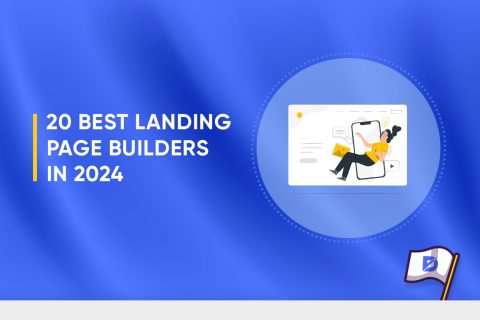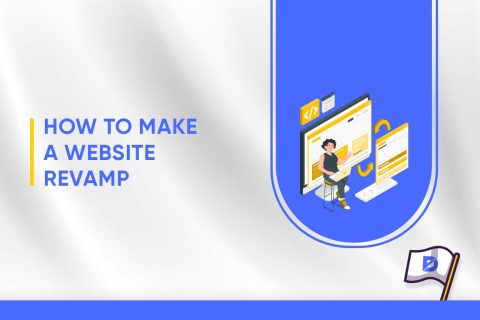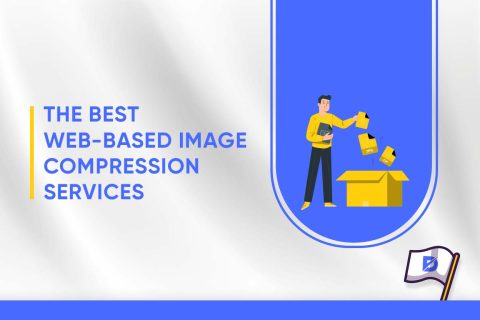No one can escape from being online today. Whether you want to share your business’s contact information or inform your audience about a topic or event, a website is essential. However, you may not be good at technology, coding, or programming. Don’t worry; you can still make your own website. Although most people think creating a website requires sufficient technical knowledge or coding skills, it’s much easier than they think.
While there are several ways that you can use, we are going to talk about the easiest way of setting up a website from scratch. Do you have any idea what this is? We are talking about website builders. In order to create a website with a site builder, there are several steps you should follow:
Time needed: 1 day
While there are several ways that you can use, we are going to talk about the easiest way of setting up a website from scratch. Do you have any idea what this is? We are talking about website builders. In order to create a website with a site builder, there are several steps you should follow:
- You should define your website type.
You should define your website type. In this step, the key question is, ‘What kind of website do you want to create?’
- You should register a domain name.
In this step, you can use gTLDs or ccTLDs; don’t worry, we are going to explain them in detail.
- You should choose a website builder.
There are hundreds of options available on the web. However, in our guide, you can see the two most used website builders; WordPress and Wix.
Before look at these steps in detail, let’s examine the top advantages of using a website builder to create your site.

4 Top Advantages Of Using a Website Builder
Easy To Use: As we mentioned above, website builders are the easiest and quickest way to set up and develop your website. What do we mean by that? If you are not good at technology, coding, or programming, you can still set up a website. This is because you don’t need to write code or have HTML knowledge.
Flexible Changes: Everything changes every day; you have to adapt to changing conditions. Thanks to website builders, you don’t need to write new code each time to upgrade your website. Since these platforms provide hundreds of easy drag-and-drop interfaces, you can easily change the design or content.
Lower Level Risk: If you aren’t a professional code writer, errors in coding will become unavoidable. Even if there is a tiny error, your website will not load. However, website builders minimize any errors that may occur.
Low Cost: Setting up a professional-looking website can be very costly for your business, especially if you don’t have sufficient coding knowledge. On the other side, many website builders offer free templates; even paid templates are much cheaper and affordable than a web developer.

Steps of Setting Up a Website
Even building a website from scratch seems like a long path, there are three essential points you consider. First, define your website; second, register a domain name; third, select a website builder. Let’s examine them step by step.
Define Your Website Type
Remember the key question we touched on above. What was that? ‘What kind of website do you want to create?’ You should answer this question in the first stage. Well, the answer depends on what you want to do on the internet. Do you want to make money or just give your business’s contact information? Here, we listed five different websites, but there are more.
- Online Stores or E-commerce Websites: Business websites allow you to sell your products and services on the internet so that you can make money directly from your own platform.
- Blogs: Blogs are online platforms where individuals write and share their own ideas or views about specific topics.
- Portfolio Websites: Portfolio websites display your previous work. In other words, portfolio websites are the online form of physical portfolios.
- Social Media Websites: Social media is not limited to Facebook, Twitter, or Instagram. Social media platforms allow people to exchange opinions and connect with other people. Think about Quora.
- Magazine and News Websites: Magazine and news websites have a similar structure to blogs. Unlike them, however, news websites are objective, educational, and informative.
- Register A Domain Name: There are different types of domain names you can own, from ‘.net’ to ‘.org’ If the domain name you want has not been taken yet, then your first option should be ‘.com’
Your domain name depends on your purpose as well. What do we mean by that? There are two major domain name categories. These are ‘generic top-level domains’ also known as gTLDs, or ‘country-code top-level domains’ also known as ccTLDs. You are confused, aren’t you? Don’t worry. You already know what these are. ‘.com,’ ‘.edu,’ ‘.net,’ and ‘.org’ are located in the first group. On the other hand, the second group can only be used for specific countries, such as ‘.co.uk (United Kingdom),’ ‘.ca (Canada),’ ‘.de (Germany),’ or ‘.co (Colombia).’
Choose a Website Builder
There are hundreds of website builders out there that allow you to build a website from scratch. These platforms provide thousands of customizable website templates. If you use one of these templates, you don’t need to write code or HTML or have other technical skills like Javascript or PHP.
Now, we are going to examine the two most popular website builders: WordPress and Wix.

WordPress
We’ve all heard of WordPress, right? It is an open-source website builder platform that lets you create your own professional-looking websites.
If you are planning to make your own website with WordPress, you should weigh its pros and cons. Let’s start with the positive sides.
The Pros
- WordPress is an open-source platform. It means that anyone can see, change and study the codes without writing them from scratch.
- Setting up a website is a continuous process. If you work with a web developer, your cost will constantly increase. However, WordPress is free to install, and its premium themes are available at affordable prices.
- WordPress provides thousands of pre-built website templates that you can freely choose.
- You can simply update your website whenever you want without any technical knowledge or coding skills.
- There are approximately 60,000 plugins available that provide a wide range of features, from caching plugins that speed up your website to advanced SEO techniques like All In All SEO or Yoast SEO. Thus, you can find plugins for everything you are looking for to increase the functionality of your website.
- Since mobile phone usage is higher than ever, Mobile SEO is almost essential. Therefore, you should optimize your website and make it responsive to mobile devices. In this case, most WordPress themes are already responsive by default.
The Cons
- It is not enough to install WordPress to create a professional-looking web design; you should install multiple plugins, but the more plugins you add, the more compatibility problems you face. Moreover, updating your website frequently may damage its functionality because plugins may stop working.
- WordPress is the most commonly used content management system (CMS). Although it provides sophisticated security plugins, the platform is the primary target for cybercriminals. This is because the platform allows third parties to develop plugins; it may cause malicious code.
- Although WordPress is a free website builder, you need to use customizable plugins and themes from time to time. At this point, your cost will increase in direct proportion to the number of plugins and themes you use.

Wix
Wix is a perfect alternative to WordPress. It lets you design and make your own website without any coding skills. Of course, like WordPress, Wix has some advantages and disadvantages. Let’s examine them one by one.
The Pros
- Wix provides many easy drag-and-drop interfaces where you can choose any feature for your website. Thus, it does not matter if you don’t have much technical knowledge.
- There are more than 800 redesigned templates available on Wix. The website builder provides optimized templates for mobile devices and desktop computers, so you don’t need to worry about mobile SEO.
- Hundreds of website applications can be simply integrated into your Wix website.
- Wix offers you guides that help you optimize your site for organic traffic from Google, Yahoo!, Bing, etc.
- You can get 24/7 support from Wix Customer Care Experts whenever you have a problem.
- You can cancel your Wix premium plan within the first 14 days if you don’t like their services.
- Wix provides the automatic website backup feature; you can restore your website whenever you want. Thus, your data, designs, and other important information will never lose.
The Cons
- Wix provides a free version that lets you set up a simple website. However, it is not enough to access all its features and functions if you want to create a professional-looking website.
- When you want to change your original template on Wix, all the content you have created needs to be transferred manually. Templates cannot be changed.
- Compared to other website builders, Wix is much more expensive with its monthly and yearly plans.
- Even Wix provides optimized templated for mobile SEO, technical SEO could be better.
- Website page loading speed plays a critical role in your website’s usability. However, Wix’s pages load slowly, so your website’s usability may dramatically reduce.
- Finally, if you use Wix’s free plans, your website will carry Wix branding.
How to Make Your Own Website In Short
Thanks to website builders, anyone can set up a website, regardless of technical knowledge and coding skills. Thus, we can say that website builders are the easiest way to create a website from scratch. Before setting up a site, there are three major steps you should follow: Define your website type; it can be an e-commerce website, portfolio website, social media website, news website, or blog; Register your domain name; it can be a generic top-level domain (gTLDs) or country code top-level domain (ccTLDs); Choose a website builder. At this point, there are a lot of website builders available that can help you set up your own website. To better assist you, we have talked about the two most popular builders. These are WordPress and Wix. Of course, both have some advantages and disadvantages; we have listed them above. Now that you know more about how to make your own website. Just be patient and choose the best website builder for you!
Frequently Asked Questions About
Bluehost, GoDaddy, Domain.com, Network Solutions, Namecheap, BuyDomains, NameSilo, Google Domains, HostGator, DreamHost, etc.; there are hundreds of websites available on the web.
We can’t give an exact number because the cost depends on several factors. For example, the more features you buy, the more the price goes up.
As we mentioned above, the easiest way is to use a website builder. However, if you are good at coding and programming, the whole process will be more straightforward for you.
It’s totally up to you; you can build as many websites as you want.
To create a website, you will need a domain name, web hosting, content, and a website builder/web designer.





No comments to show.